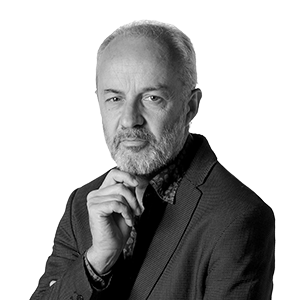

Production + consumption, information + communication. What lies beyond these two overwhelming common-law couples that have us trapped and impose a frenetic pace of life on us? Do we, as humans of the 21st century, retain anything spiritual, transcendent? Is there any possibility of silent, non-instrumental beauty in our lives?
From the hand of Simone Weil, the French anarcho-syndicalist thinker of Jewish origin who converted to Christianity, the Korean-German philosopher Byung-Chul Han seeks answers to what he considers a "decline in attention", the result of phenomena such as binge watching: to gorge oneself endlessly on audiovisual products.
In the essay About God. Thinking with Simone Weil (Ediciones 62, translated by Guillermo Gómez Sesé), Han says that we are obese cattle of consumption and proposes a fast from the gaze, a return to the contemplative attention proper to religion. Leave the addiction to the cell phone, to mems—which are viruses—and to all the media nonsense. Stop, meditate, be silent. Practice attentive reading. Via Simone Weil—"the spirit is attention"—, he links this to a return to religion: "The term religion comes from relegere (reread)". A return that seems strange to us, right? But the cry of alert is entirely timely.
Perhaps attention, which is lost today in the consumption of stimuli, "is spirituality," but as the thinker himself says, it also contains a social dimension: "Both empathy and respect are based on being attentive to others. Society becomes dirty when attention to others is damaged. It leads to an increase in violence. It also becomes muddy if it only revolves around power and the economy. We live in "an age without eros," without deep attention, without sacredness. "Without attention, without waiting or patience, no thought is possible," notes Han, who warns us that AI lacks the spirit of "creative attention." He prefers Socrates, for whom thought has the intensity of a prayer, or Paul Celan, who understands a poem as a prayer that brings us closer to others.
Simone Weil said: "Attention is the rarest and purest form of generosity." Of course, nothing to do with the mindfulness (mindfulness) that degenerates spirituality into efficiency and performance, into neoliberal self-care and self-management, and that is rooted in the Protestant ethic of capitalism as defined by Max Weber.
The Han-Weil tandem makes a complete amends to the cult of I, that has made us all entrepreneurs of ourselves and priests of ourselves. We have stopped paying attention to the world, to nature, to others, to mystery. Trump is the apotheosis of the narcissism of power, money—consumption—and communication. The thermodynamics of power guides human instinct: we tend to occupy all the power—political, economic, relational...—that is within our reach.
Can one resign? It may sound corny, but it would mean moving toward a community of love and friendship, of forgiveness and compassion. "In the face of the growing destruction of the world's beauty, and the new expansion of nationalism and hatred abroad, Simone Weil's absolute universalism is today more necessary—more imperative, even—than ever," writes Han.
The "I would prefer not to" of the civil servant writing Melville's Bartleby represents the renunciation of the "dead letter" in favor of the "spirit." The renunciation of the market of noise that increases the accumulation of capital and sickens the soul. What has become of inner silence? "Information as noise has broken attention," says Han. How difficult it is today to close one's eyes and remain silent, how difficult it is to achieve a beauty without purpose, a beauty that goes beyond the consumerist aesthetics of like Complacent, one that doesn't shy away from or fall into indifference to the world's pain.
"People are anesthetized with consumption and pleasure. The obligation to be happy dictates life." Digital and emotional acceleration does the rest. Han declared: "The three monsters of current civilization are capital, digitalization, and artificial intelligence. They reduce the human being, the spirit, to a slave of quantum mechanics and efficiency. Once again, we become slaves of our own creation."
